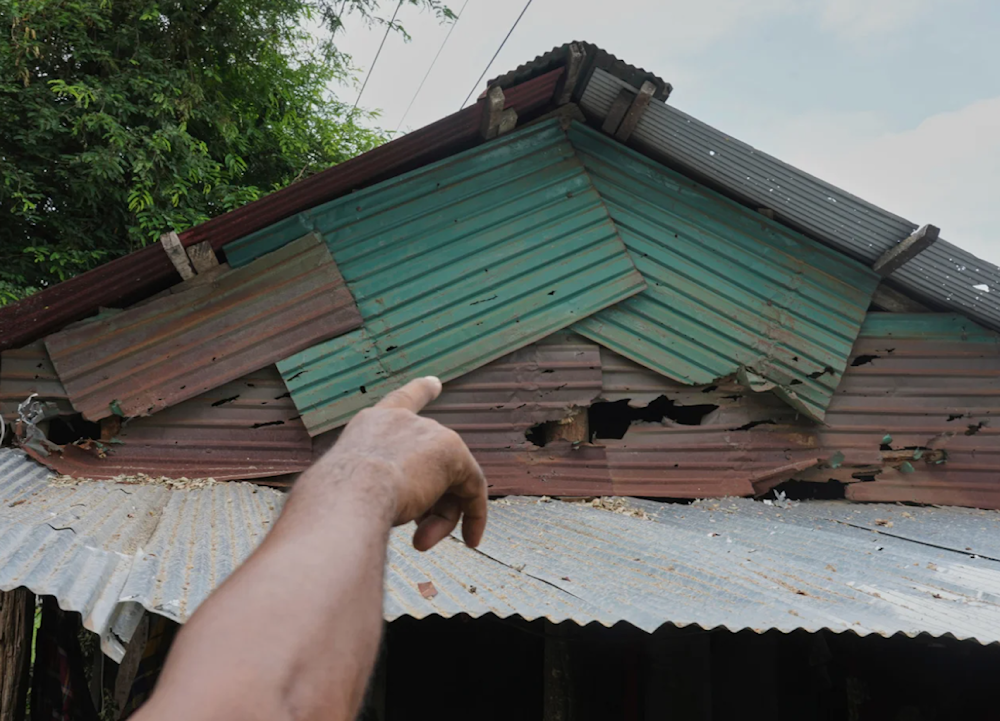Thailand, Cambodia trade blame over ceasefire violations
The Thai government spokesperson Jirayu Huangsab has acknowledged overnight skirmishes but claimed that "the Thai side maintained control of the situation."
-

A Cambodian villager points to the roof of a house damaged reportedly by Thailand in Phrong village, Oddar Meanchey province, Cambodia, on July 30, 2025 (AP)
Thailand and Cambodia traded accusations on Wednesday over violations of a recently brokered ceasefire that had largely curbed open hostilities along their shared border.
The truce, which went into effect Tuesday, followed five days of deadly clashes that left at least 43 people dead on both sides. The violence stemmed from a long-standing dispute over ancient border temples and erupted into fierce fighting along their 800-kilometre (500-mile) frontier.
Despite the agreement, Thailand's Foreign Ministry reported that its troops in the Sisaket province came under fire overnight. According to the Ministry, Cambodian forces launched small arms and grenade attacks that continued into Wednesday morning.
"This represents a flagrant violation of the ceasefire agreement," the Ministry said in a statement.
Thai government spokesperson Jirayu Huangsab also acknowledged overnight skirmishes but claimed that "the Thai side maintained control of the situation" and that "general conditions along the border are reported to be normal" as of 8:00 am (0100 GMT).
Meanwhile, a Cambodian Defense Ministry official accused Thailand of breaching the truce twice on Tuesday, undermining the fragile calm that had prompted both countries to evacuate more than 300,000 people from the conflict zone.
At a temple in Surin city, Thailand, about 50 kilometres from the border and now serving as a shelter and field kitchen, volunteer Thanin Kittiworranun said evacuees remain uncertain about what comes next.
"We don't believe Cambodia will hold the ceasefire," the 65-year-old told AFP.
Both nations reaffirm to China commitment to ceasefire
An AFP journalist stationed on the Cambodian side of the border reported hearing no artillery fire between the start of the ceasefire and Wednesday morning, despite a steady drumbeat of shelling since fighting began the previous Thursday.
Meanwhile, China said its deputy foreign minister, Sun Weidong, hosted a meeting in Shanghai with officials from both Thailand and Cambodia, where both sides "reaffirmed to China their commitment to abide by the ceasefire consensus."
As part of the ceasefire agreement, meetings between opposing military commanders went ahead along the border. Thailand’s army reported that both sides agreed on de-escalation measures, including "a halt on troop reinforcements or movements that could lead to misunderstandings."
Still, later in the day, Bangkok’s border crisis centre issued a warning through spokeswoman Maratee Nalita Andamo: "In this moment, in the early days of the ceasefire, the situation is still fragile."
The recent violence has been intense, with jets, rockets, and artillery leaving at least 15 Thai soldiers and 15 Thai civilians dead. Cambodia, in turn, has confirmed eight civilian and five military casualties.
Thailand, Cambodia, reach ceasefire after intense fighting
Cambodia and Thailand reached an agreement to implement an "immediate and unconditional ceasefire," which took effect at midnight local time on July 29, following several days of intense clashes along the disputed border between the two countries.
The ceasefire, mediated by the Malaysian Prime Minister in his capacity as the current chair of the Association of Southeast Asian Nations, will see the two countries meeting at the top-general level on Tuesday.
The clashes began with a fatal military skirmish in a disputed neutral zone on May 28, in which a Cambodian soldier was killed. Tensions escalated significantly on July 24, when landmines injured Thai troops and both militaries exchanged fire.
Thailand subsequently launched "Operation Yuttha Bodin," imposing martial law across eight border districts and shutting key crossings and temples, while Cambodia responded by banning Thai products and broadcasting content, escalating the diplomatic standoff further.
The violence has displaced more than 138,000 individuals from Thai border regions and 80,000 from Cambodia.

 4 Min Read
4 Min Read










